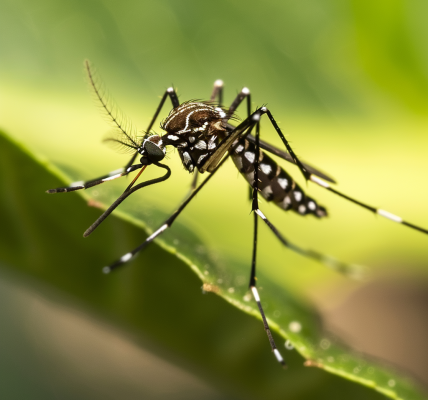An urgent warning has been raised regarding the potential health risks posed by invasive mosquitoes during the upcoming Paris Olympic Games. Experts are particularly concerned about the tiger mosquito, a species known to carry dengue fever, which has been detected in several European countries, including France.
Howard Carter, a bite prevention specialist, has highlighted the alarming possibility that the influx of visitors to the Olympics could lead to a significant rise in dengue fever cases. He refers to the event as a potential “super-spreader event,” where the combination of increased human activity and the presence of disease-carrying mosquitoes could facilitate the spread of this tropical virus.
The European Centre for Disease Prevention and Control (ECDC) has confirmed that tiger mosquitoes have been found in 13 EU countries, raising concerns about the transmission of dengue fever, which is typically endemic to tropical regions. With rising global temperatures, these mosquitoes have expanded their habitat, now reaching as far north as Paris, where health authorities are actively monitoring and trapping them to prevent outbreaks.
Since 2016, tiger mosquitoes have also been reported in the UK, prompting warnings from the UK Health Security Agency (UKHSA). The presence of these mosquitoes in the UK, combined with the increasing number of dengue fever cases in Europe, has intensified concerns among health officials.
Carter elaborated on the situation, stating, “Dengue fever is on our doorstep. European cases have dramatically increased. The Asian tiger mosquitoes that have the capacity to carry the deadly virus are currently in the UK.” This statement underscores the urgency for travelers to take precautions when visiting areas where these mosquitoes are prevalent.
To mitigate the risk of mosquito bites and potential infection, experts recommend several preventive measures. These include wearing long-sleeved clothing, using insect repellent containing DEET, and avoiding outdoor activities during peak mosquito activity times, which typically occur at dawn and dusk.
As the Paris Olympics approaches, health officials are urging attendees to remain vigilant and informed about the risks associated with mosquito-borne diseases. The situation highlights the interconnectedness of global travel and public health, emphasizing the need for individuals to take personal responsibility for their health while participating in large-scale events.
In addition to dengue fever, health experts are also monitoring other mosquito-borne diseases that could potentially spread during the Olympics. This includes diseases such as Zika virus and chikungunya, both of which are transmitted by similar mosquito species. The presence of these diseases in Europe further complicates the public health landscape as the games draw near.
Travelers are encouraged to stay updated on health advisories and to consult with healthcare providers regarding vaccinations or preventive treatments before embarking on their journeys. The health risks posed by invasive mosquito species are not to be taken lightly, especially in light of the potential for increased transmission during high-profile events such as the Olympics.
As the world prepares for the excitement of the Paris Olympics, it is crucial for both participants and spectators to prioritize their health and safety. By understanding the risks and taking appropriate precautions, individuals can enjoy the festivities while minimizing their exposure to potential health threats.
In summary, the emergence of tiger mosquitoes in Europe and the UK marks a significant public health concern as the Paris Olympic Games approach. The potential for dengue fever and other mosquito-borne diseases to spread during this global event necessitates heightened awareness and proactive measures from all attendees. By staying informed and prepared, individuals can help protect themselves and their communities from the threat of these invasive species.





